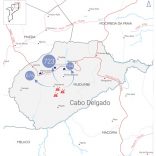Mozambique: Nearly 1,600 displaced in Muidumbe over a few days
New media law in Mozambique “is terrible” for journalists – NGO

File photo: Lusa
The coordinator of the African program of the non-governmental organisation (NGO) Committee for the Protection of Journalists (CPJ) considers that the new media law in Mozambique is “terrible” and defended that “it should never see the light of day”
“The new media law is terrible and should never see the light of day; it is a major violation of press freedom,” said Angela Quintal in an interview with Lusa about the situation of press freedom in Portuguese-speaking countries, following the attack on Radio Capital, in Guinea-Bissau.
For this former journalist in South Africa, in Mozambique there is “an impunity that gives licence to those who want to attack journalists and censor the press, because they know there will be no consequences if they do so”.
In the case of Angola and Guinea-Bissau, the activist argues that criminal defamation is an error that dates back to colonial times and exists in several African countries, but is particularly worrying in the case of Portuguese-speaking countries.
“It is not only Lusophone Africa that has criminal defamation laws, there are also in Anglophone and Francophone countries, but in African Lusophone there seems to be the idea that the world is not watching, because the lingua franca is English or French,” he explained.
“A great majority of people don’t understand Portuguese, and that’s why they don’t know what’s going on, but that’s precisely why it’s important for NGOs to show solidarity with what’s happening, governments should be shamed to the point of changing laws,” he stated.
The bills to regulate the exercise of journalism were approved on 27 October, 2020, by the Mozambican Council of Ministers, with consultations by parliamentary commissions taking place before the discussion, and voting in the plenary of the Assembly of the Republic was scheduled.
In an interview with Lusa in November, the executive editor of Canal de Moçambique, Matias Guente, a newspaper whose offices were set on fire in 2020 by persons still unidentified, said about the new law that “the impression that remains is that [the legislative package] was conceived in a police station” and that “journalists are treated as the enemy”.
The draft law provides that journalists lose the right to defend themselves in cases of defamation against the President of the Republic, although the right to defence is part of the Constitution. There is also a redefinition of restrictions on private investment in the media and the overlapping between disciplinary and supervisory bodies.












Leave a Reply
Be the First to Comment!
You must be logged in to post a comment.
You must be logged in to post a comment.